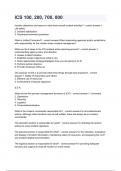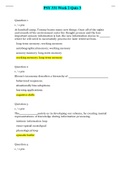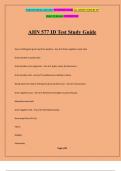Exam (elaborations)
RELI 448N WEEK 8 Final Exam
- Course
- Institution
RELI 448N WEEK 8 Final ExamQuestion 1. 1. (TCO 1) A common element often found in religions is: (Pts: 4) respect for sculpture. feelings of wonder. rules governing meditation. use of permanent places of worship. Question 2. 2. (TCO 1) The position that argu...
[Show more]







